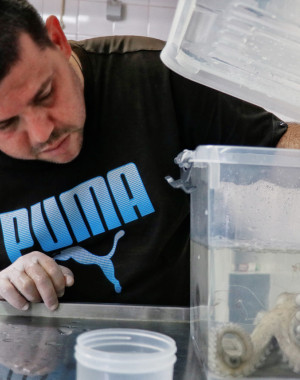Juan C. Capaz graduated in Marine Biology, completed an MSc in Aquaculture and Fisheries, specialty in Fisheries (Universidade do Algarve, 2011 and 2013, respectively). Currently, a FCT Scholarship PhD student at FCT-UAlg's Marine, Earth and Environmental Sciences course, with fisheries and aquaculture specialization. At CCMAR, his PhD thesis "OctoBUC - Multidisciplinary study on the octopus (Octopus vulgaris) trap fisheries: Bait effectiveness, residence times, catch rates and bycatch", is a multidisciplinary project aiming to the optimization of the common octopus trap fishing sector performance in Portugal, assessing trap effectiveness and baits attraction by sea and captive video recordings. Commercial catch rates and associated bycatch will be analysed in an integrative way, for quantitative and qualitative results over this resource management. Expected results includes preferential feeding behaviours, new telemetric transponders implantation methodological practices and animal welfare captive recovery conditions, aiming for best potential performance/retention achievement. Previously, as a scientific research studentship at UAlg/CCMAR, project SEPIACUL (Reproductive performance maximization of European cuttlefish, Sepia officinalis), had focused his young research career on the development of cephalopod culture. One year working for CCMAR as superior technician had given him complementary formation and knowledge in multidisciplinary aquaculture about many other marine species. His academic formation focused on fisheries, with a MSc thesis on fish communities structure sampled by BRUVS in south Portugal coastal waters, plus the last 7 years dedicated to cephalopods aquaculture research improvement (SEPIABREED, SEPIATECH), allowed him 5 papers publication in international peer review journals, some others in preparation and the direct involvement in many other associated studies, that allowed him to extend his international collaborations network. With a particular interest in a marine resource of high commercial value, captive and wild cephalopods, seeking to dedicate himself to behavioral study, ethology, productivity, reproduction, welfare conditions in captivity and the adaptation of new technologies applicable to his studies, both in the fisheries sector as well as in aquaculture. Personally, he is a young dedicated and inventive researcher, thirsty for knowledge and new challenges, within his areas of interest and training, seeking to raise the bar of his challenges in building a solid and recognized career, always up for a new discovery.


